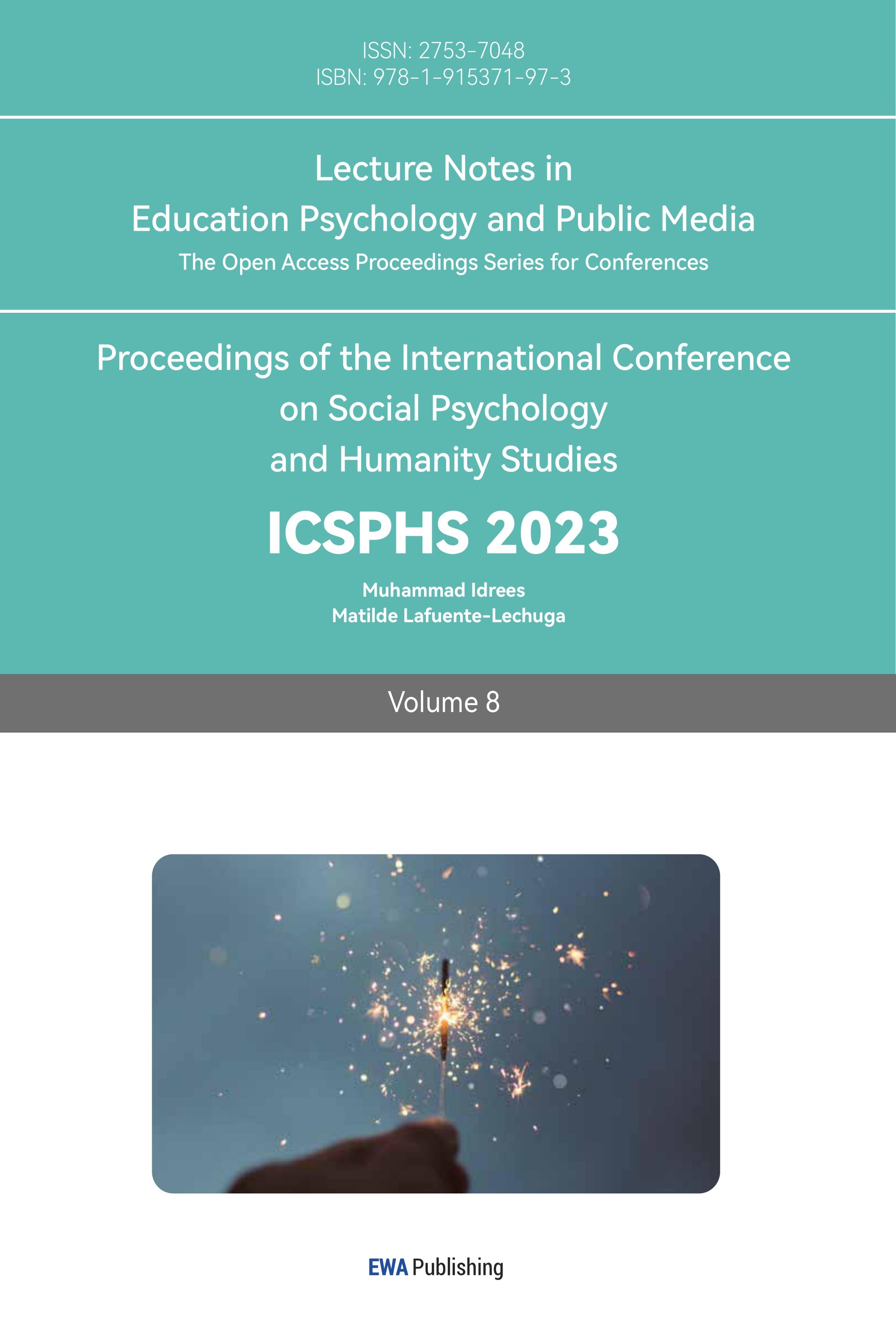References
[1]. Feng Jianjun. (2004). On the Concept of Personalized Education. Science in Education (02),11-14.
[2]. Chen Zhili. (2011). Advocating Personalized education. Chinese Journal of Education (10),3.
[3]. Wu Primary School & Wang Zhonghua. (2014). Class Management: From Nanny-style to Student Autonomy -- Based on the consideration of Personalized education. Modern Primary and secondary Education (07),108-110. doi:10.16165/j.cnki.22-1096/g4.2014.07.010.
[4]. Liu LiPing. (2013). Middle school implementing personalized education studies (master's degree thesis, shanxi university).https://kns.cnki.net/KCMS/detail/detail.aspx?dbname=CMFD201401&filename=1013325241 .nh.
[5]. Shang Yan. (2009). Small class education background of class management (master's degree thesis, east China normal university). https://kns.cnki.net/KCMS/detail/detail.aspx?dbname=CMFD2010&filename=2010029008. Nh.
[6]. Liu Xian-Jun. (2011). Exploration of personalized education in colleges and universities. Higher Education Research (03),1-9.
[7]. Li Gen. (2015). The role of counselors' "personalized development" in college students' "Personalized Education". Chinese Adult Education (06),63-64.
Cite this article
Zhou,Z. (2023). Research on How to Implement Personalized Education in China. Lecture Notes in Education Psychology and Public Media,8,138-142.
Data availability
The datasets used and/or analyzed during the current study will be available from the authors upon reasonable request.
Disclaimer/Publisher's Note
The statements, opinions and data contained in all publications are solely those of the individual author(s) and contributor(s) and not of EWA Publishing and/or the editor(s). EWA Publishing and/or the editor(s) disclaim responsibility for any injury to people or property resulting from any ideas, methods, instructions or products referred to in the content.
About volume
Volume title: Proceedings of the International Conference on Social Psychology and Humanity Studies
© 2024 by the author(s). Licensee EWA Publishing, Oxford, UK. This article is an open access article distributed under the terms and
conditions of the Creative Commons Attribution (CC BY) license. Authors who
publish this series agree to the following terms:
1. Authors retain copyright and grant the series right of first publication with the work simultaneously licensed under a Creative Commons
Attribution License that allows others to share the work with an acknowledgment of the work's authorship and initial publication in this
series.
2. Authors are able to enter into separate, additional contractual arrangements for the non-exclusive distribution of the series's published
version of the work (e.g., post it to an institutional repository or publish it in a book), with an acknowledgment of its initial
publication in this series.
3. Authors are permitted and encouraged to post their work online (e.g., in institutional repositories or on their website) prior to and
during the submission process, as it can lead to productive exchanges, as well as earlier and greater citation of published work (See
Open access policy for details).
References
[1]. Feng Jianjun. (2004). On the Concept of Personalized Education. Science in Education (02),11-14.
[2]. Chen Zhili. (2011). Advocating Personalized education. Chinese Journal of Education (10),3.
[3]. Wu Primary School & Wang Zhonghua. (2014). Class Management: From Nanny-style to Student Autonomy -- Based on the consideration of Personalized education. Modern Primary and secondary Education (07),108-110. doi:10.16165/j.cnki.22-1096/g4.2014.07.010.
[4]. Liu LiPing. (2013). Middle school implementing personalized education studies (master's degree thesis, shanxi university).https://kns.cnki.net/KCMS/detail/detail.aspx?dbname=CMFD201401&filename=1013325241 .nh.
[5]. Shang Yan. (2009). Small class education background of class management (master's degree thesis, east China normal university). https://kns.cnki.net/KCMS/detail/detail.aspx?dbname=CMFD2010&filename=2010029008. Nh.
[6]. Liu Xian-Jun. (2011). Exploration of personalized education in colleges and universities. Higher Education Research (03),1-9.
[7]. Li Gen. (2015). The role of counselors' "personalized development" in college students' "Personalized Education". Chinese Adult Education (06),63-64.









